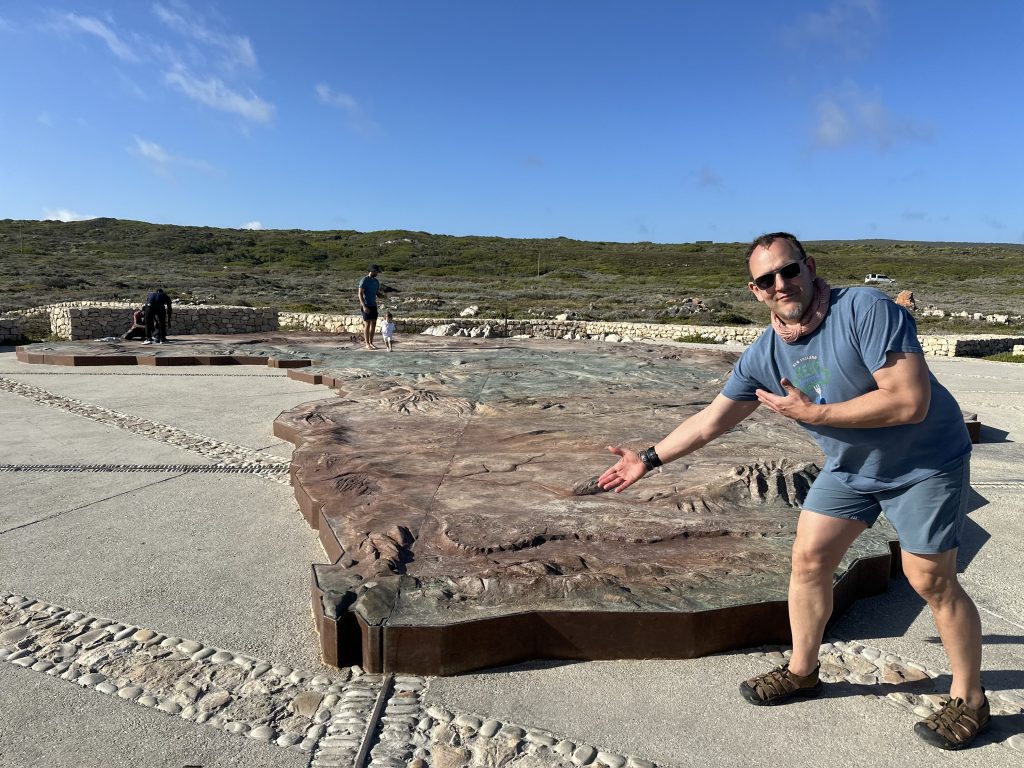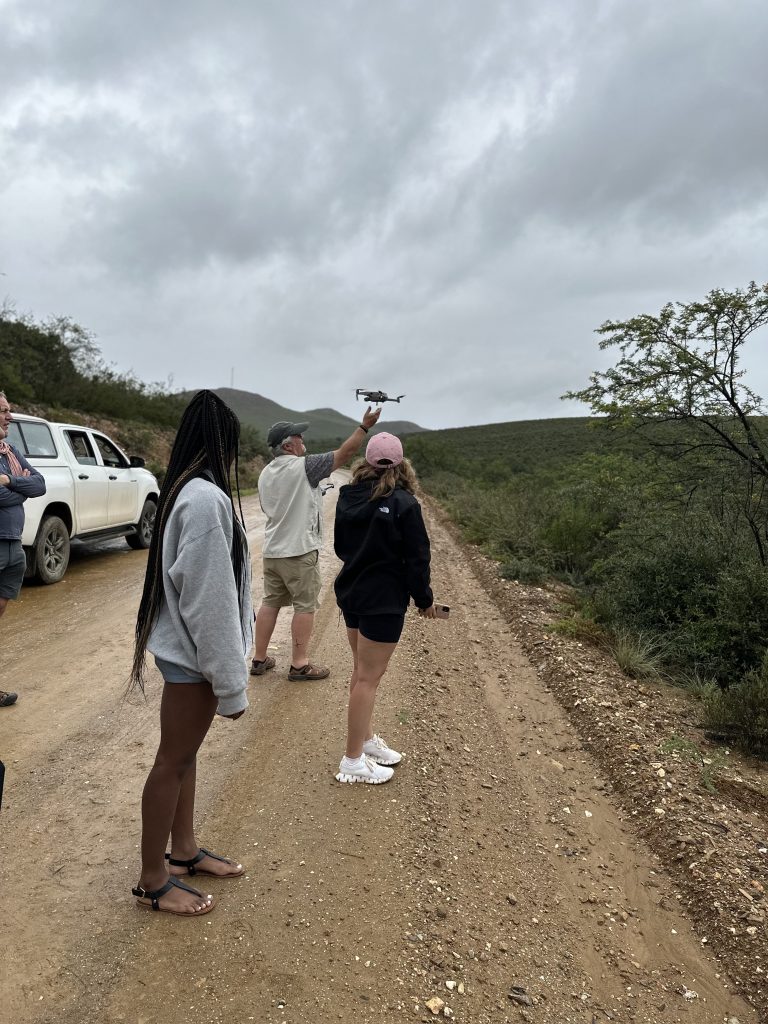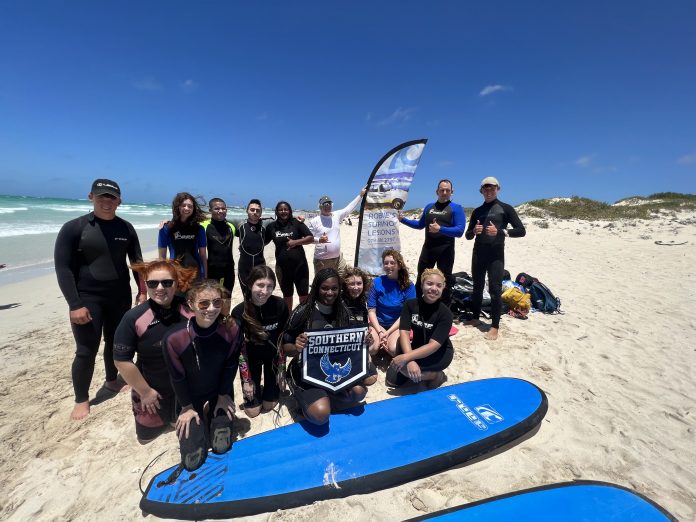This winter, 12 Southern students participated in a faculty-led study-abroad trip to South Africa to broaden their perspectives on the continent’s southernmost country. During the 17-day program, students engaged firsthand in the study and analysis of environmental justice issues and sustainable development practices in South Africa’s Western Cape Province.
Here are three travelers to share their experiences:
Theresa Cocola, ’23 – Environmental Systems and Sustainability Studies
Shanti Madison, ’21 – Environmental Systems and Sustainability Studies, currently studying education at the University of Pennsylvania
Lydia Masala, ’23 – Biology
What inspired you to take this trip?
SM: I’d always had a hunger for study abroad and experiential learning. When I came to SCSU as an Environmental Systems and Sustainability Studies major, I was thrilled that I’d be able to receive the benefits of experiential learning.
The South Africa Abroad Studies was an amazing way to not only reconnect with my geographical studies but it supplied amazing data for my graduate research of teaching styles and the benefits of experiential learning. I was able to see how learning about the geopolitical and environmental justice initiatives in South Africa could leave such a lasting impression of learning on students across identities.
TC: Dr. Heidkamp runs two study-abroad trips. I went on his Iceland trip over the summer and had such a great time and made really great connections with other students on that trip. Therefore, I decided to attend his second trip to South Africa.
What was your favorite part of the experience by far?
TC: Getting to know the people that are a part of this trip as well as the people we have met in South Africa has been my favorite part of the experience. Meeting all the different people in South Africa with different lives and experiences is so incredible.
Getting to know people has given us a connection to what we are learning. Furthermore, getting to know the people in my group on the trip has provided me with connections that will last long after the trip ended.
How is environmental justice incorporated in this trip?
TC: Environmental justice is really successfully woven into the whole trip. Every day we visited somewhere new such as a dam to discuss water security and farms to analyze food security, the economic influence of agriculture, and labor conditions. Most impactful though were the informal settlements that we were able to safely visit and were able to get to know some of the people who lived there.
LM: We noticed how vital race, class, and ethnicity are in determining a person’s socioeconomic status, inspiring me to want to help improve the many issues I witnessed.
How has the experience influenced your understanding of environmental justice?
TC: As an Environmental Systems and Sustainability major, we talk a lot about environmental justice but experiencing it has given me such a deeper understanding. Climate change is not just an issue that is affecting the planet, it is an issue affecting people. Environmental justice is about recognizing that the problems we are causing to the planet are negatively affecting real people who are not unlike you and me.
SM: Leaving South Africa, I can look more critically at the nature of development and expansion. Within the current economic makeup of many nations, there can be no ethical consumption within capitalism. Because of fixed rules of social operation, many of the Have Nots are left vulnerable to continued abuse and manipulation by the Haves.
This, as I’ve seen in South Africa, results in the overdependence on unskilled, seasonal farmworkers in lieu of skilled, permanent farmers who should be entitled to South Africa’s constitutionally guaranteed human rights including minimum wage, housing, and paid leave. Hiring primarily seasonal work gets big industries out of having to abide by that and in turn, ensures greater economic growth.



How did your major influence your decision to travel abroad?
TC: My major did influence my decision to travel abroad because environmental and sustainability issues are global problems. Climate change is affecting the world and people in different ways. Getting the opportunity to travel abroad has been so important to my education on environmental systems and sustainability.
LM: We visited a farm that focused on the aquafarm project. As a biology major, I understood the importance of how biodiversity and plants are impacted by natural and human-altered ecosystems.
SM: I am a graduate of Southern and received my B.S. in Environmental Systems and Sustainability Studies. This trip is in alignment with everything I’ve learned in that major. In my current role as an education major at the University of Pennsylvania, I have a huge influence on studying this course from a pedagogic lens to see the benefits of experiential learning.
What was involved in the prep for this trip?
TC: Dr. Heidkamp emphasizes the importance of not going to a new place without first knowing anything about it. Therefore, we did do pre-work before going on the trip to understand not just South Africa’s history but also gain a baseline knowledge of the environmental justice issues that the country faces.
LM: We read articles about environmental justice and completed assignments along with discussion logs to expand our thinking.
What are some cultural differences you’ve observed in South Africa as compared to the United States?
TC: There is a very rich culture in South Africa from the food to the way of life. There are many different traditions there that are beautiful, but the history of the apartheid era can also be seen. Additionally, what I found interesting was the clear divide you can see between South Africa’s culture and the influence colonialism has played there.
SM: Every day in South Africa, residents prepare for one, two, or sometimes three power outages. This is called load shedding and happens on purpose in order to prevent the underdeveloped power grid of South Africa from blowing out completely. Day to day we had to prepare to go several hours at a time without light, electricity, or WiFi.
Why should Southern students travel abroad and how has this experience changed you?
TC: I believe all Southern students, whether in this major or not, would benefit from this South Africa study abroad. This experience does not just teach you about the world, it teaches you about yourself. This study abroad has given me a new perspective on the world and allowed me to expand my horizons.
SM: In order for us to grow as learners, young professionals, and global citizens we need to meet each other across country lines and see our similarities and differences. Only by doing so can we uncover who we really are and how we might like to change ourselves to leave our mark on the world.
* * * * * * * *
Southern’s Office of International Education is a central hub to promote study-abroad opportunities, welcome our international students, and support our international faculty. Learn more about upcoming study abroad programs and faculty-led trips for Southern students: https://inside.southernct.edu/international/study-abroad


